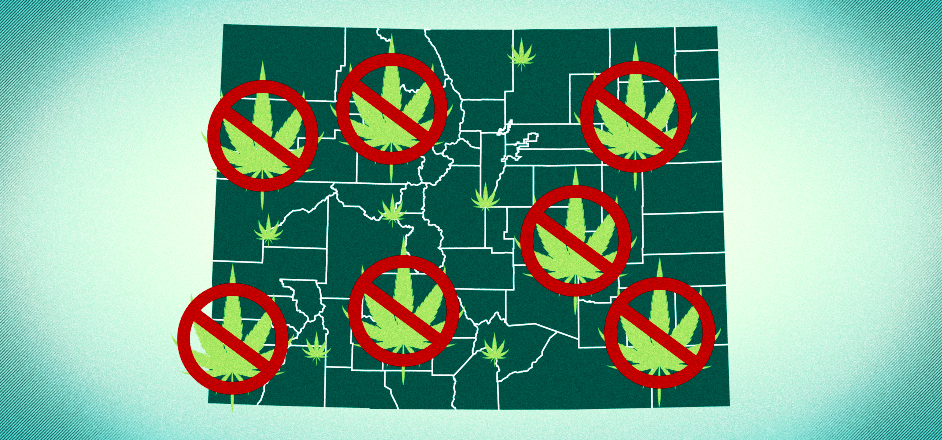Most think of Colorado as one of the friendliest places in the world for weed.
Which it is, at least in the center of the state — near, in and around the cities of Denver and Boulder.
However, when Amendment 64 passed in 2012, it gave every town the option of "Just Saying No" to pot. Surprisingly, most cities have decided to take up that offer even though it hasn't increased crime, only tax revenues.
Of the 272 municipalities in Colorado — according to reports from the Colorado Municipal League — 168 of them (over 60 percent) don't currently have pot shops or pot grows or even pot bakeries. It's still a cannabis desert in most of the state.
"Everything that Colorado said yes to, Akron said no to," says Dencia Raish over the phone. She's the town clerk of Akron, population 1700 — a two-hour drive east of Denver where people farm dry land wheat and are 35 minutes away from the nearest dispensary. "We're small, we're rural, and it's a very conservative community," she adds. "At the beginning, the feeling was that, 'That's a drug and drugs are bad.'"
The town of Meeker, population 2,600, a four-hour drive northwest of Denver in the gorgeous green Rockies, also turned down legal weed.
"It's fairly conservative, because it's mostly ranching and government jobs," says Scott Meszaros, Meeker's town manager. A lot of folks in town "kinda have that typical — D.A.R.E., Nancy Reagan, gateway drug kind of thinking."
But it's not all about what they think of the drug. What's most important, some of the folks in these small towns say, is that the people there just simply don't smoke weed.
"There's not enough of a desire from enough of the population to warrant legalizing the sale of marijuana," says Heather Brooks, city manager of Alamosa, a town of 9,000 near the rugged desert of the south-central part of the state. If more people wanted legal weed, there would probably be a vote, she says.
In the way that America, politically, is a sea of red with small dots of blue, so Colorado is a sea of prohibition with a few small dots of green. Those dots, however, are where most of the people live — in congested municipalities. Because of that, Colorado's rural areas are sort of stuck with an "old days" mentality, from after liquor prohibition when towns and cities across America had bars and liquor stories, yet still a lot of the country remained dry.
"There's an urban-rural split," says Kevin Bommer, Deputy Director of the Colorado Municipal League. "All politics is local."
If anything, this is a success story, a blueprint for other states as they legalize marijuana to look over — proof each town can do what it wants, while the rest of the state stays pretty happy. Moving forward, Las Vegas can roll up joints while Elko stays sober; and Boston can get wicked high while Middleborough country passes, but doesn't puff.
In these small towns, where fewer people smoke pot than in bigger cities, the picture of the pot smoker isn't always positive. Raish, the Akron town clerk, says that when the town of Log Lane Village, 35 minutes away, opted for legal weed, it brought in an unwanted element.
"I'm trying really hard not to say mean things" about pot smokers, Raish says, with the polite straightforwardness typical of small-town Coloradans. "There's all kinds of educated, productive, engaged people that smoke pot every day. And if those were the people that moved to Akron (if weed were legal), that'd be fine. But that's not who comes. It's people just showing up living in vans on the river. Unemployed and living out of their cars."
Whether any of that's true or not, that's what some people think in places like Akron. And that's why they, and many like them (even in Colorado), won't have pot in their town.




Leave a Reply